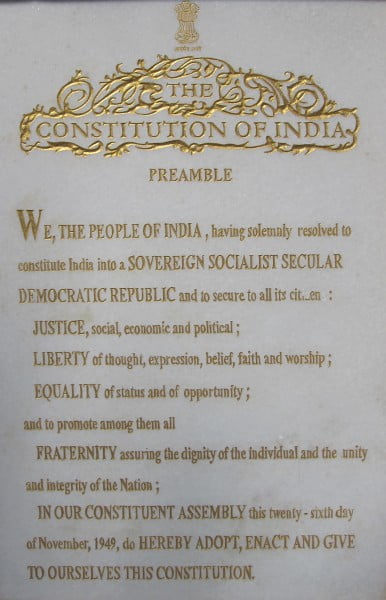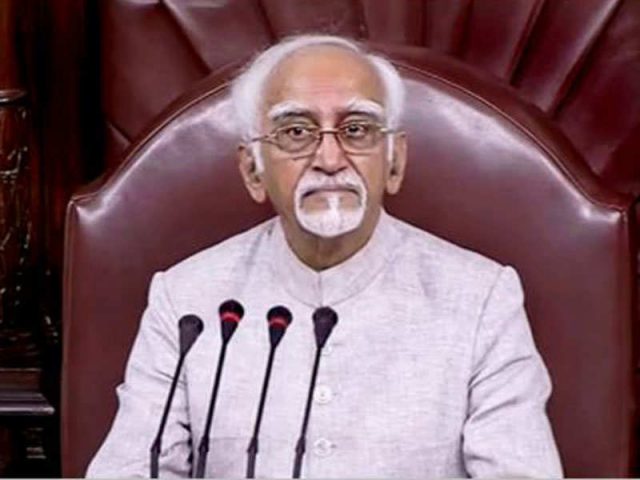
The Preamble gives us the liberty of faith and worship; but nor does the Preamble give us the liberty to establish separate religion based judicial systems, neither the Constitution of India.
But a few self-proclaimed intellects take this unjust liberty.
The Politics Game
Congress leader and Karnataka’s minority affairs minister – B Z Zameer Ahmed Khan has decided to support All India Muslim Personal Law Board’s plan to open Sharia courts in all districts of the country ― another act of hollow rhetoric by an opposition leader before the elections.
AIMPLB’s declarations of establishing Sharia courts across the country is seemingly an intent to subvert the present legal system and establish a parallel law judicial system, empowering Islam in the country.
This was accentuated by former Vice President Dr. Hamid Ansari backing up the proposal stating that each community has the right to practice its own personal law in an interview.

What Harm Will Religion-based Courts Do?
It is true that each religion is given equal weightage in the Indian Constitution and evidently has the right to practice its own personal law.
But establishing courts which abide laws of a particular religion eliminates the secular identity of the nation privileging the particular sect.
The Indian Judicial system has been designed to cater to all religions, sects, creeds, genders and castes.
There are no special provisions for anyone, and as always stated, “No one is above the law”. Sentiments of millions and the strength of the Constitution will be on stake with AIMPLB’s proposal.
Also Read: Angry At Your Politician? Use This Politician Rating App And Change The Face Of 2019 Elections
What Are The Sharia Courts Exactly?
According to a 2011 UNICEF report, sharia law provisions are discriminatory against women from a human rights perspective. In legal proceedings under sharia, a woman’s testimony is worth half of a man’s before a court.
Moreover, Sharia courts will essentially be arbitration bodies whose verdicts won’t be bound by the main judicial bodies.
“AIMPLB BELIEVES IN INCLUSIVENESS,”
SAID THE ALL INDIA MAJLIS-E-ITTEHADUL MUSLIMEEN PRESIDENT WHO IS PART OF THE PERSONAL LAW BOARD.
“THESE ARE DARUL QAZA AND THEY RESOLVE DISPUTES SPEEDILY AT VERY LITTLE EXPENSE.”
The extent of these speedy systems of such courts being inhuman or biased is uncertain.
The Real Threat To Secularity Of India
Speculations say that 300 Sharia courts already exist in our country, mostly running under hidden profiles. The number may go up to 700+ if AIMPLB gets its way with establishing Sharia courts all over the country in every district.
No blasphemy meant, but if such courts are established, we will soon see women being beaten up for not wearing burkhas and probably, inhumane formed capital punishments being practiced as in certain parts of the middle east.
While the constitution allows all religions to practice their own laws and be comfortable with the traditions and rituals they have, putting up special courts for a particular sect of the society will only increase the depth of religious discrimination and cause hellish disturbance in the nation.

The question about the authority of the AIMPLB leaves us all intrigued. The proposal of Sharia courts also disturbed certain sections of the Muslim community who felt this would portray them as a minority trying to rise to power through non-constitutional methods.
Just before elections, this could change the face of the Indian Judicial System. BJP has shown strong condemnation towards the idea. The rest remains in the powers of the Supreme Court.
Image Sources: Google Images
Sources: Indian Express, Wikipedia, Firstpost
You’d Also Like To Read:
http://edtimes.in/2018/06/congress-backs-bjp-for-rejecting-un-report-on-kashmir-rightfully-so/



























